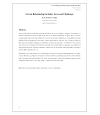

The conviction record could include the noncitizen's indictment, jury instructions, plea agreement and colloquy.Recent Examples on the Web Charlie and Joanie’s colloquy in the thoroughfare is also a mutual reassurance that the other’s dream has value. This is the "modified categorical approach" and it permits the court to look at the facts from the conviction record. If the state statute is overbroad and divisible, apply the "modified categorical approach" to determine which crime the client was convicted. The analysis reaches the third step when a statute of conviction is both overbroad and divisible.If the statute is indivisible and also overbroad (see step 1), the inquiry should end and the noncitizen should prevail. If a statute is divisible, the analysis moves to the next step. It involves statutory interpretation through analysis of the plain language (e.g., use of alternative "or" statements in the statute of conviction signal divisibility whereas a list of illustrative examples suggest means), as well as through state court decisions and approved jury instructions. Determine if the state statute of conviction is divisible. This inquiry requires distinguishing the elements of the statutory crime of conviction from the means.Wilkinson, found that when the plain language of a statute of conviction is overbroad, a noncitizen is not required to also show that there is a "reasonable probability of prosecution" to meet the minimum conduct test. NOTE: The 8th Circuit, per Gonzalez v.If, however, the state's definition of the crime goes beyond (i.e., is broader than) the generic (federal) definition of the crime, and if there is a "realistic probability, not a theoretical possibility that the state would apply its statute to conduct that falls outside the generic definition of a crime," there is no categorical match and the inquiry moves to the next step ( Moncrieffe v. If the state's definition of the crime fits within the generic definition of the crime, there is a categorical match, which triggers removal. Compare the definition (elements) of the crime in the state statute of conviction with the definition (elements) of the crime in the generic (federal) statute.This inquiry requires research into the federal statutes and federal case law interpreting and applying those statutes and Find the generic (federal) definition (elements) of the crime.

These inquiries require research into state criminal statutes and state court decisions that interpret/apply the statutes. Identify the minimum conduct required for guilt under the statute of conviction. Identify the definition (elements) of the statute of conviction.

The "categorical approach" is an analysis courts undertake to determine if a noncitizen's criminal (state) conviction triggers grounds for removal under the federal immigration statutes.


 0 kommentar(er)
0 kommentar(er)
